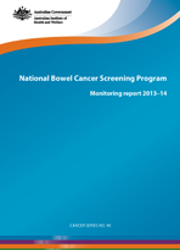Summary
The National Bowel Cancer Screening Program (NBCSP) aims to reduce the morbidity and mortality from bowel cancer by actively recruiting and screening the target population for early detection or prevention of the disease.
The NBCSP has been running since August 2006, and this report focuses on measures of program performance for people invited to participate in screening between July 2013 and June 2014 (those turning 50, 55, 60 or 65).
Program participation has increased
Of the 1.4 million people invited between July 2013 and June 2014, 36.0% returned a completed bowel cancer screening kit for analysis. This overall participation rate was higher than the participation rate of 33.4% in 2012-13 (Table 1). The increase was mainly due to the start of the second round of invitations to 55 and 60 year olds, who had higher rates of re-participation. For those receiving their second invitation after participating 5 years earlier, the re-participation rate was more than 70%.
How many positive screening results were there?
Of those participants who returned a valid screening test, about 37,700 (7.5%) had a positive screening result. These people were encouraged to follow up this result by visiting their primary health-care practitioner (PHCP) for referral to further investigative testing (colonoscopy). Sixty-eight per cent of those with a positive screening result were recorded as having had a follow-up colonoscopy at the time of this report.
The positivity rate (percentage of positive faecal occult test results) for those participating for the second time (6.3%) was lower than for initial screens (8.2%).
How many bowel cancers and adenomas were detected?
One participant in every 25 who underwent a colonoscopy to follow up a positive screening result was diagnosed with a confirmed or suspected cancer (149 and 599 participants respectively), while advanced adenomas were found in a further 1,691 participants (1 in 11 colonoscopies assessed). Adenomas are benign growths that have the potential to become cancerous, and their removal is likely to lower the risk of future bowel cancers in these patients.
Were there differences between subgroups participating in the NBCSP?
Women were more likely to participate in screening than men; conversely, men had higher rates of screen-detected bowel cancers, overall bowel cancer incidence and mortality.
Aboriginal and Torres Strait Islander participants, participants who lived in Regional and remote regions, and participants who lived in areas of lower socioeconomic status, continue to have higher rates of positive screening results, yet lower rates of follow-up colonoscopies than other participants.



